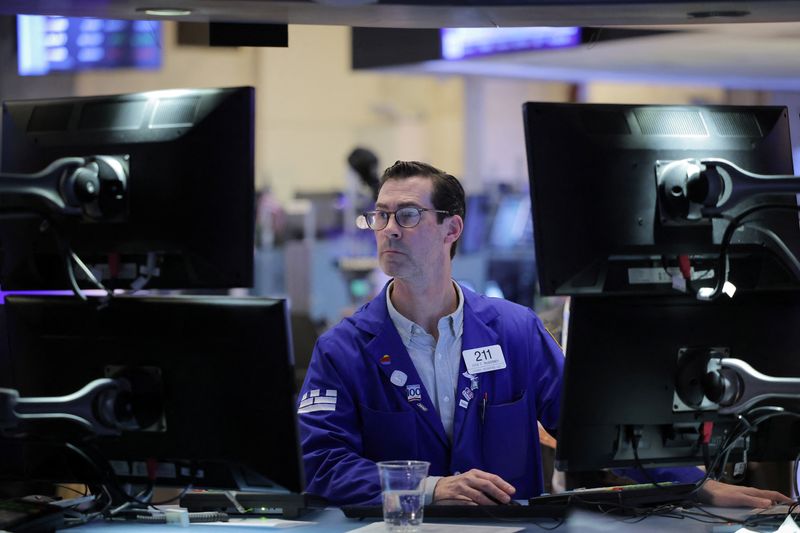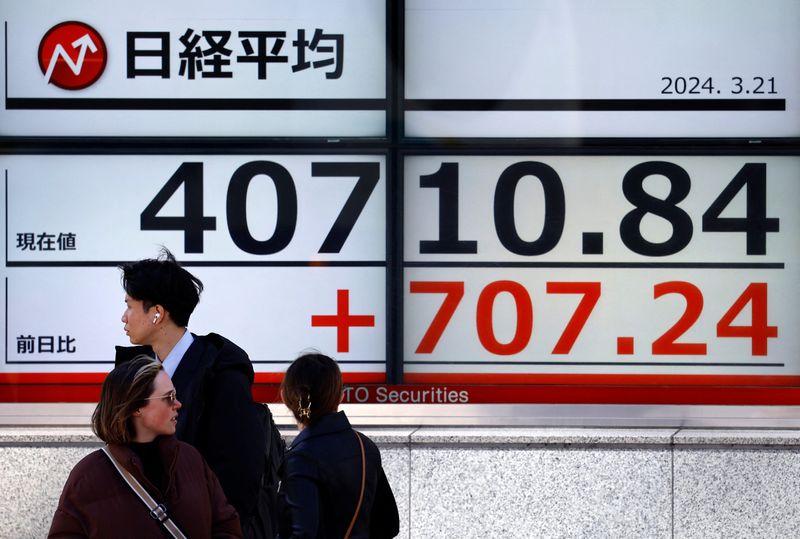By Stephen Culp
NEW YORK (Reuters) -Wall Street ended sharply lower on Monday amid rising U.S. Treasury yields as simmering tensions in the Middle East helped curb investor risk appetite.
The three major U.S. stock indexes reversed initial gains to extend Friday's sell-off, while the yen fell to its lowest level in 34 years, reviving intervention fears.
U.S. retail sales data for March blew past analyst expectations, provided the latest evidence in the case for the resilience of the American consumer but also suggested the U.S. Federal Reserve could hold off on cutting its key policy rate for longer than previously anticipated.
"Market expectations have transitioned from three expected rate cuts this year down to fewer than two," said Bill Merz head of Capital Market Research at U.S. Bank Wealth Management in Minneapolis. "That’s the concern that markets are reflecting while the equity rally has stalled in recent weeks."
On the geopolitical front, over the weekend Iran launched a missile and drone attack against Israel in retaliation for a suspected attack on its embassy, and calls for restraint regarding Israel's response appeared to be calming helping tensions in the region.
"I would say that the level of uncertainty is higher than it was a week ago on the geopolitical stage and it’s understandable to see higher market volatility in the current environment," Merz added.
The Dow Jones Industrial Average fell 248.13 points, or 0.65%, to 37,735.11, the S&P 500 lost 61.59 points, or 1.20%, to 5,061.82 and the Nasdaq Composite dropped 290.08 points, or 1.79%, to 15,885.02.
European shares ended modestly higher as weak energy shares capped gains in industrial stocks, while cautions investors kept close watch on developments in the Middle East.
The pan-European STOXX 600 index rose 0.13% and MSCI's gauge of stocks across the globe shed 1.01%.
Emerging market stocks lost 1.12%. MSCI's broadest index of Asia-Pacific shares outside Japan closed 1.06% lower, while Japan's Nikkei lost 0.74%.
Yields for 10-year U.S. Treasuries rose, hitting their highest level since November after a robust Retail Sales report suggested the Fed could hold its key policy rate in restrictive territory for longer than expected.
Benchmark 10-year notes last fell 29/32 in price to yield 4.6158%, from 4.499% late on Friday.
The 30-year bond last fell 63/32 in price to yield 4.7323%, from 4.603% late on Friday.
The dollar touched its highest level since early November against a basket of world currencies as the yen dipped to a 34-year trough.
The yen move helped revive anticipation of the possibility of intervention on the part of Japanese authorities.
The dollar index rose 0.15%, with the euro down 0.17% to $1.0624.
The Japanese yen weakened 0.60% versus the greenback at 154.23 per dollar, while Sterling was last trading at $1.2445, down 0.04% on the day.
Crude oil prices inched lower after Iran's weekend attack on Israel proved less damaging than anticipated.
U.S. crude dipped 0.29% to settle at $85.41 per barrel, while and Brent settled at $90.10 per barrel, down 0.39% on the day.

Gold surged on rising on safe-haven demand sparked by geopolitical tensions.
Spot gold added 1.8% to $2,385.39 an ounce.
